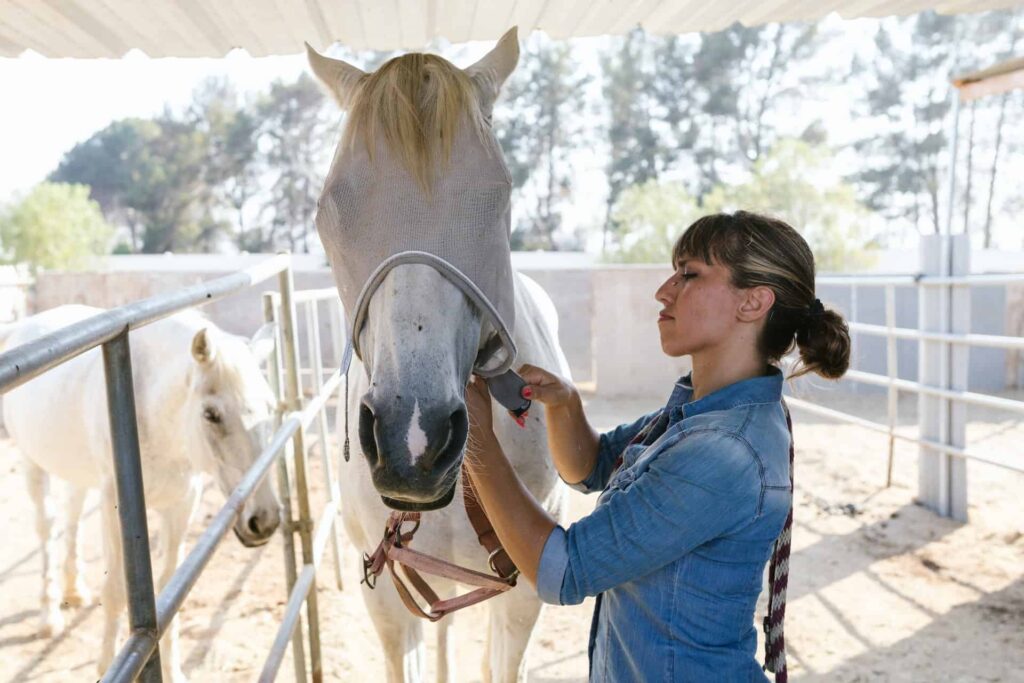A horse worming schedule is an important aspect of maintaining the health and well-being of equines. It involves the regular administration of deworming agents to your horses to protect them from gastrointestinal parasites such as roundworms, tapeworms, and bots. Effective horse deworming considers various factors like the type of wormer, the horse’s age, and environmental conditions to ensure the best results in horse health.
Understanding and implementing a proper worming schedule for your horses is crucial due to the numerous parasites that can infest them, posing health risks such as colic, weight loss, poor performance, or even death. Therefore, to safeguard your horses from the damage these parasites can cause, it is essential to adopt a comprehensive worming program that includes regular fecal egg counts, the use of appropriate medications, and the management of your horses’ environment.
Key Takeaways
- Horse worming schedules are vital for maintaining equine health and protecting them from harmful parasites.
- Implementing a comprehensive worming program includes regular fecal egg counts, appropriate medication selection, and environmental management.
- Proper worming schedules should consider factors like the type of wormer, the horse’s age, and environmental conditions.
Understanding Horse Worming
Horse deworming aids in maintaining the overall health and well-being of the animal. Regular worming helps to prevent and control internal parasite infestations, which can cause severe conditions such as colic, weight loss, and poor performance. Developing a proper horse worming schedule is crucial for ensuring successful parasite management.
Various types of worms can infest horses, including roundworms, tapeworms, and small strongyles. Each type has a different life cycle and may require specific deworming strategies. Due to the risk of developing resistance to deworming medications over time, use them judiciously and in a targeted manner. This is where understanding the life cycles of common parasites can play a vital role in establishing an effective worming program.
Proper horse worming begins with a fecal egg count (FEC) test, which helps to determine the level of parasite infection in individual horses. This information allows the owner or veterinarian to make informed decisions about when and how to administer deworming medications. By using FEC tests, horse owners can implement a targeted deworming approach, ensuring that only horses with high parasite burdens receive treatment.
Another important aspect of understanding horse worming is the role of pasture management in preventing parasite transmission. Regular pasture cleaning, rotating animals between pastures, and avoiding overgrazing can significantly reduce the risk of infection. Good pasture management helps to disrupt the life cycles of parasites, making it more difficult for them to infest horses.
In conclusion, understanding horse worming is crucial for maintaining the health and well-being of your equine companion. Regular FEC tests, targeted deworming, and good pasture management can greatly reduce the risk of internal parasite infestations and ensure the long-term health and happiness of your horse.
Importance of Worming Schedule in Equine Health
A well-planned horse worming schedule is crucial for maintaining optimal health and avoiding serious health issues in horses. Worm infestations can cause various complications, including weight loss, poor coat condition, and most notably, colic, which is considered a major cause of disease and death in horses.
Adhering to a proper worming schedule helps prevent the buildup of parasites within the horse’s body. Equine parasite control typically involves using different dewormers, such as Equell, Ivercare, and Zimecterin. These products target specific types of worms and ensure the effective elimination of parasites.
Colic is a common and critical health condition related to worm infestations in horses. By maintaining a regular worming schedule, horse owners can minimize the risk of colic and its associated distressing symptoms, such as abdominal pain and bloating. Proper deworming practices help to control the presence of harmful worms, like cyathostomins, that are heavily associated with colic.
When developing a horse worming schedule, take into account various factors, such as the horse’s living environment, pasture management, and exposure to other animals. Periodic fecal egg count tests are a helpful method for determining the appropriate deworming frequency and selecting the most effective dewormer for the specific infestation.
To increase the program’s effectiveness, horse owners should rotate dewormer classes, which reduces the development of drug resistance in parasites. Some horses may require more frequent deworming, while others may thrive on a more strategic, targeted approach. Consulting with a veterinarian is crucial when designing a personalized worming schedule to ensure that it meets each horse’s specific needs and prioritizes their well-being.
A consistent and well-planned worming schedule maintains equine health and prevents critical issues such as colic. With the implementation of appropriate dewormers, fecal egg count monitoring, and veterinarian guidance, horse owners can safeguard their animals’ health against potentially devastating parasite-related complications.
Identifying Equine Parasites
Horse parasites are a significant concern for horse owners and veterinarians, as they can cause various health issues and impact the well-being of horses. Identifying the common parasites in horses aids in establishing an effective worming schedule and maintaining optimal health for these animals.
Some of the common parasites found in horses include tapeworms, small strongyles, large strongyles, and cyathostomins. Tapeworms, especially the Anoplocephala species, can cause weight loss, colic, and digestive problems as they attach to the intestinal lining. Regular fecal testing and targeted deworming treatments are necessary to manage tapeworm infestations effectively.
Small strongyles, also known as cyathostomins or small redworms, can cause anemia, diarrhea, and weight loss in horses. These parasites are highly resistant to certain deworming medications, underscoring the importance of an appropriate deworming program. Large strongyles, also known as bloodworms, are more pathogenic and can cause serious arterial damage, leading to poor circulation and potential colic.
In addition to strongyles, other common equine parasites include roundworms, ascarids, pinworms, and bots. Roundworms, also known as ascarids, usually infect younger horses, causing respiratory problems and intestinal blockages. Pinworms, although less harmful, can cause itching and discomfort around the horse’s tail due to their eggs.
Bots are not worms but the larvae of botflies, which can cause gastrointestinal irritation and impaction when ingested by horses. These larvae can be found attached to the stomach lining and expelled with the help of targeted deworming treatments.
A proper deworming schedule, regular fecal testing, and close collaboration between horse owners and veterinarians can help minimize the effects of these parasites and preserve the well-being of the animals.
Different Types of Wormers
Horse owners should be aware of the various types of wormers available to keep their equines healthy and free from internal parasites. The choice of dewormers depends on factors such as the type of worms present, the horse’s age, and the environment. This section will discuss the popular types of wormers and their active ingredients.
Ivermectin is a widely used anthelmintic that effectively treats and controls a variety of parasites, including large and small strongyles, ascarids, pinworms, and bots. It is often found in products like Zimecterin, Equimectin, and others.
Fenbendazole is another common anthelmintic that targets large and small strongyles, pinworms, and ascarids. Administer the appropriate dosage for successful treatment which can be found in products like Panacur and Safe-Guard.
Moxidectin is a powerful anthelmintic that eliminates large and small strongyles, encysted small strongyles, and bots. Products containing moxidectin, like Quest, should be used cautiously with proper consideration of the horse’s weight and age.
Praziquantel is an active ingredient, often combined with ivermectin or moxidectin, that effectively treats and controls tapeworms. Popular products include Zimecterin Gold and Equimax.
Pyrantel pamoate is a versatile wormer that targets large and small strongyles, pinworms, and ascarids. It’s available in products like Strongid P and Rotectin.
Oxibendazole is an anthelmintic suitable for treating large and small strongyles, pinworms, and ascarids. It is the main ingredient in Anthelcide.
Rotate wormers to ensure the most effective treatment and reduce the risk of resistance. Using different active ingredients in wormers allows for a broader range of coverage against various species of parasites, while also minimizing the chances of a particular anthelmintic losing its effectiveness.
Apart from chemical wormers, it is advisable to consider non-chemical parasite management techniques such as proper pasture control, regular fecal egg counts, and maintaining the cleanliness of the environment. These actions reduce the overall reliance on anthelmintics, therefore lowering the risk of parasites developing resistance to treatments.
Role of Fecal Egg Count in Worming Schedule
Fecal egg count (FEC) is a valuable tool in determining the most appropriate worming schedule for horses. By analyzing fecal samples for the presence and quantity of worm eggs, horse owners can make informed decisions on the frequency and type of deworming treatments needed for their animals. This approach ensures that horses receive adequate protection against internal parasites while avoiding unnecessary treatments that can contribute to resistance.
Fecal egg counts provide information on the shedding status of a horse, categorizing them as high shedders, moderate shedders, or low shedders. High shedders have a comparatively higher number of worm eggs in their manure, while low shedders have a lower egg count. Moderate shedders fall in between these two categories. By identifying a horse’s shedding status, an appropriate deworming treatment plan can be devised, targeting the specific needs of the animal.
The fecal egg count reduction test (FECRT) is another useful method to assess the effectiveness of deworming treatment. By comparing FEC values before and after treatment, the degree of reduction in egg count can be measured. This information helps determine whether the anthelmintic used is still effective in controlling the parasite burden, allowing for adjustments in treatment if necessary.
Identifying the egg reappearance period (ERP) for specific deworming treatments helps in building an effective and informed worming schedule. ERP is the time it takes for egg counts to return to pre-treatment levels after administering a deworming treatment. Knowing the ERP for each anthelmintic used allows horse owners to plan the treatment intervals optimally, ensuring adequate protection against parasites while reducing the likelihood of resistance development.
To perform an FEC, horse owners should collect fresh feces samples from their horses and submit them to a lab or a veterinary clinic equipped to carry out the analysis. A standardized process is followed to quantify the number of worm eggs in the sample, providing valuable information that helps create a tailored worming schedule for each horse.
The use of fecal egg counts, along with FECRT and ERP data, plays a crucial role in developing an effective worming schedule for horses. This targeted approach not only ensures the welfare of the animals but also helps combat resistance issues in the long run.
Worming Schedule throughout the Year
Here’s a great yearly horse worming schedule to follow:
| Season | Risk Level | Key Parasites | Deworming Recommendation | Additional Notes |
|---|---|---|---|---|
| Spring | Increased due to fresh pastures | Small strongyles | Late April or May | |
| Summer | Continued exposure to various parasites | Various based on fecal egg count | Monitor fecal egg count & adjust schedule | |
| Fall | Some risk as grazing season winds down | Active fall parasites | September | |
| Year-Round | Varies | Varies | As needed based on fecal egg count | Rotate pastures, monitor egg count regularly |
You can expand on the “Additional Notes” column or add other columns as needed for more specifics or if you have other factors to consider in the worming schedule.
A proper horse worming schedule is crucial for maintaining the health of your horses. The schedule may vary depending on factors such as the region, the horse’s environment, and grazing practices. However, a general guideline can be followed to ensure that your horse remains healthy throughout the year.
In the spring months, horses typically graze on fresh pastures, leading to an increased risk of worm infestation. During this time, deworm your horse to target parasites such as small strongyles, which are more prevalent in spring. A deworming treatment in late April or May is recommended.
During the summer months, from June to August, horses are more likely to be exposed to various types of parasites, making it necessary to continue with regular deworming treatments. Keep an eye on the fecal egg count and adjust your worming schedule accordingly.
As we move into fall, the grazing season starts to wind down, and horses may be at a lower risk of worm infestation. However, still maintain a deworming schedule during this time. Administering treatment in September is recommended, as it targets parasites that tend to be more active in the fall.
Throughout the entire year, you should practice good pasture management to minimize the risk of worm infestations. One effective strategy is to rotate pastures to ensure that horses have access to fresh and clean grazing areas. Furthermore, implementing regular fecal egg count testing and targeted deworming treatment can help ensure your horses remain healthy and parasite-free all year round.
In summary, a proper worming schedule should include routine treatments during the spring, summer, and fall months. Be sure to adjust your schedule based on factors unique to your horse’s environment and follow good pasture management practices.
Deworming Young and Pregnant Horses
Deworming is also especially important for young and pregnant horses. Foals and pregnant mares require special attention to ensure they receive proper care during these critical stages.
Foals are more vulnerable to parasites due to their developing immune systems. It is important to follow a horse worming chart and work with a veterinarian to devise an appropriate deworming schedule. Generally, foals should receive their first deworming treatment between 2 and 3 months of age. Subsequent treatments should be administered every 2 to 3 months until they reach adulthood.
For adult horses, a targeted deworming strategy should be implemented to decrease the likelihood of parasite resistance. Pregnant mares should be dewormed within 30 days of foaling to minimize the risk of passing parasites to their newborns (https://digitalcommons.unl.edu/cgi/viewcontent.cgi?article=2149&context=extensionhist). An effective deworming program for broodmares should focus on addressing the specific needs of the mare and her unborn foal (https://clinicaltheriogenology.net/index.php/CT/article/view/10126).
Pregnant mares should receive treatments with deworming products that have a “safe in pregnant mare” claim. Each horse is unique, so consult with a veterinarian to determine the most suitable deworming schedule and products for the pregnant mare.
Following a horse worming chart and a proper deworming schedule for both adult and young horses is vital for reducing the risk of complications, such as colic (https://www.sciencedirect.com/science/article/pii/016758779500551X). By paying close attention to the needs of foals, mares, and pregnant mares, horse owners can ensure the health and well-being of their equine companions.
Implementing an Effective Worming Program

An effective deworming program involves the use of wormers (also known as horse dewormers or anthelmintics) to eradicate and control internal parasites like strongyles, ascarids, and pinworms. The key to a thriving worming program is to work closely with a veterinarian, use science-based recommendations and practices, and monitor the health of the horses regularly.
Selecting the Right Wormers: There is a variety of deworming products available on the market, and it is vital to select the appropriate ones based on the specific parasites present in the horse. Horse owners should consult a veterinarian to determine the best worming products to use, as some parasites may have developed resistance to certain dewormers. The choice of horse wormers should also consider factors such as the horse’s age, weight, and specific health conditions.
Strategic Worming Schedule: Implementing a strategic worming schedule involves regular use and rotation of deworming products to minimize the risk of developing resistance and maintain healthy horses. This approach may include fecal egg count tests to evaluate the parasite burden and administer deworming treatments when needed. The rotation of wormers should be guided by a veterinarian and be consistent with the recommended dosing instructions.
Environmental Management: Maintaining the cleanliness of the paddocks and stables is crucial for reducing the risk of parasite infection. Regular harrowing can help break up manure and expose parasite eggs to sunlight, which can kill them. The paddocks should be routinely cleaned, and any new horses should be quarantined and dewormed before being introduced to the existing population.
Monitoring the Horse’s Health: Horses should be monitored closely to assess their immune system, weight, and overall health. Regular blood tests, saliva tests, and fecal egg count tests can provide valuable information for adjusting worming schedules and products as needed. Sudden weight loss or irritation may indicate a higher parasite burden requiring immediate attention and consultation with a veterinarian.
In conclusion, implementing an effective worming program requires a comprehensive approach that involves the selection and rotation of appropriate wormers, maintaining a clean environment, and regular monitoring of the horse’s health. By collaborating with a veterinarian and following science-based recommendations, horse owners can ensure the well-being of their animals while minimizing the risk of parasite resistance.
Understanding Medication Efficacy
Understanding the efficacy of various medications will bring optimal results. Worming products, such as Quest, Quest Plus, Equest, Panacur, and Safe-Guard, are designed to target and eliminate internal parasites that can negatively affect equine health.
One of the key factors in determining medication efficacy is how well the product eliminates cyathostomes, which are a common type of equine parasite. Cyathostome control can be a complex and problematic aspect of equine care due to variations in the efficacy of different worming products. Gaining a clear understanding of the efficiency of each medication is crucial for determining the right treatment program for a particular horse.
It’s important to remember that some regions may have differences in parasite prevalence and anthelmintic resistance. For example, horse yards located in certain areas in Italy might have different control worm programs, which could affect the efficacy of worming medications. Regional factors should be taken into account when designing a worming schedule.
To accurately measure the effectiveness of a worming medication, regularly scheduled fecal egg counts (FEC) are a recommended practice. This method can provide valuable data on the presence and abundance of parasites in a horse’s system, as well as indicate the success of the treatment program. Conducting FEC tests helps horse owners and caretakers gauge the need for adjustments in the worming schedule or product choice.
Proper horse worming practices should be guided by the principles of sustainable equine parasite control. This means that it’s important to avoid overuse or improper use of worming products, which can lead to increased resistance among parasite populations. Ultimately, the goal is to maintain a balance that minimizes the prevalence and impact of parasites on equine health while preserving the effectiveness of treatment options.
Frequently Asked Questions
How often should a horse be wormed?
The frequency of worming a horse may vary depending on factors like geographical location, age, and parasite risk. In general, a horse should be wormed every 2-3 months, but consult with a veterinarian to develop the most suitable deworming program for each horse.
What is the ideal deworming schedule for different regions?
Deworming schedules may differ across regions due to variations in climate, lifestyle, and the prevalence of specific parasites. This study suggests that location plays a role in equine acute abdominal disease risk, which could impact deworming schedules. Work with a local veterinarian to create an ideal schedule based on the regional needs of the horse.
How do seasonal changes affect horse worming?
Seasonal changes can influence the activity and reproduction of parasites that affect horses. Some parasites, such as small strongyles, have higher prevalence during the summer months, whereas others, like roundworms, are more common during the winter. Discuss these seasonal changes with a veterinarian and adjust the deworming schedule accordingly to provide optimal protection.
Which wormers are best for specific parasites?
There are various wormers available to target specific parasites in horses. For instance, Benzimidazoles – like fenbendazole – are effective against small strongyles, and Macrocyclic lactones – like Ivermectin – work well against large and small strongyles and roundworms. This study highlights the growing problem of drug resistance, emphasizing the need to consult with a veterinarian for the most effective wormer depending on the parasites present in the horse.
Are miniature horses on a different worming schedule?
Miniature horses may have a similar deworming schedule as full-sized horses. However, some factors such as size, weight, and environment may impact their parasite risk and, consequently, their worming schedule. It is always recommended to consult with a veterinarian to tailor a deworming program specifically for each miniature horse.
Can ivermectin be used repeatedly in deworming?
Ivermectin is a commonly used anthelmintic in deworming horses. While it may be used repeatedly, follow an appropriate deworming schedule and rotate anthelmintic classes to avoid creating resistance. Consulting with a veterinarian can help ensure that ivermectin and other wormers are being used safely and effectively.
Last Updated on February 16, 2024 by Nate Dewsbury



